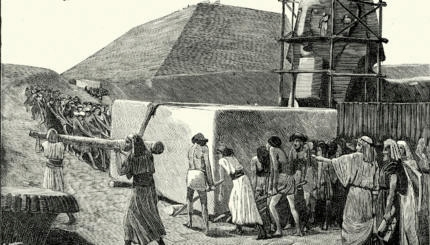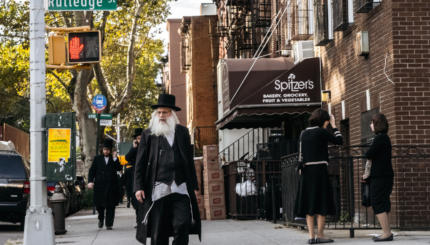Does Jewish law allow body piercing? While most contemporary Jewish authorities believe that ear piercing is generally fine, the matter grows somewhat more complex when it comes to extensive piercings or piercing other body parts.
The Bible records many Israelites with piercings, including perhaps most famously the matriarch Rebecca, who was given a nose ring to celebrate her engagement with Isaac. Historically, in Jewish communities, ear and nose piercings have not been uncommon. For example, in the contemporary Western world, many Jewish women have ear piercings. And nostril piercings have historically been popular in the Jewish communities of Kurdistan and India.
Some contemporary authorities have raised concerns that body piercing can be considered a damaging body modification (prohibited by Jewish law) and others worry that certain kinds of piercings can run afoul of Jewish values of modesty (tzniut) and respect for the body as created in the divine image (b’tzelem elohim). However, most rabbinic authorities give some weight to contemporary mores, in particular the fact that body piercing is understood today not as a sign of bodily denigration, but as an act of adornment.
Is piercing discussed in the Bible?
Yes. In the Book of Exodus, the Torah prescribes that if a Hebrew slave declares that he loves his master and does not want to be set free, the master should pierce the slave’s ear with an awl. The association of ear piercing with slavery is sometimes taken as an indication that the Torah does not look favorably upon the practice. However, other references make clear that body piercing for aesthetic reasons was practiced in biblical times. In the Book of Genesis, Abraham’s servant Eliezer gives a gift of a nose ring to Rebecca, whom he hopes will become Isaac’s wife (Genesis 24:22). When the Israelites beseech Aaron to create the golden calf, Aaron responds by instructing them to take “the gold rings that are on the ears of your wives, your sons, and your daughters, and bring them to me” — an indication that ear piercing was a practice among Israelite men as well as women (Exodus 32:2). In Ezekiel 16:12, both nostril and ear piercings are mentioned. Ornamental ear piercing is also mentioned as a common practice in the Talmud.
With your help, My Jewish Learning can provide endless opportunities for learning, connection and discovery.
Is body piercing permitted by Jewish law?
The main halachic (Jewish law) issue raised by body piercing is the prohibition on wounding, which is derived from the prohibition in Deuteronomy 25:3 that when meting out a punishment of lashes, the guilty party may not be given more than 40 lashes. (On this verse, Maimonides comments that if the Torah was careful not to allow additional lashes for a sinner, how much more so for a righteous person.) Some rabbinic authorities have raised objections to cosmetic surgery on the grounds that it constitutes a violation of this principle, a position that could theoretically be extended to body piercing. (A secondary problem, which could also theoretically be applied to body piercing, is a philosophical objection to cosmetic surgery because it implies dissatisfaction with the way God created the human body.) Other rabbinic authorities, notably Rabbi Moshe Feinstein, a leading American halachic authority of the 20th century, saw no problem with cosmetic surgery, since the intent is not to wound but to beautify. On the whole, the prohibition on damaging the body is not broadly understood to bar the piercing of ears for aesthetic purposes.
Is there a difference between piercing ears and piercing other parts of the body?
Traditional Jewish law offers no obvious basis for differentiating between various kinds of body piercing. In a 1997 responsum on the question of body piercing, Conservative Rabbi Alan Lucas asserts that it is “hard to argue …that there is a substantive difference between the nonpermanent piercing of the ear for fashion purposes and the non-permanent piercing of the eyebrow, navel or even nipple.” Lucas goes on to note that health risks are associated with piercing certain sensitive body parts and that only “medically qualified” individuals should perform piercings.
Are there types of piercing that Judaism frowns upon?
Though there is no explicit blanket prohibition on body piercing, rabbis from all three of the major Jewish denominations have raised a number of concerns about the practice.
One of them is that excessive piercing is inconsistent with Jewish values. “The way we treat our bodies, including the manner in which we ‘adorn’ them, is a statement of our attitude toward our relationship with God and our duties under the covenant,” a Reform responsum from the late 1990s on the matter reads. “Let us consider, therefore, what sort of statement we make about ourselves and our bodies when we inject pigment into our skin, when we pierce our flesh with needles, wire, studs and spikes. Let us ask ourselves whether this is truly the way that we Jews, commanded to pursue and to practice holiness, should aspire to ‘beautify’ and ‘adorn’ ourselves.”
The Lucas paper raises a similar point: “Body piercing is not prohibited, although legitimate concerns regarding tzniut [modesty] and other traditional Jewish values should be taken into consideration and guide one’s choices.”
Orthodox authorities raise a number of additional issues with body piercing, though none are universally understood to unambiguously prohibit the practice. These include the prohibition loosely defined as “following the ways of the gentiles,” a principle derived from a number of verses in Leviticus understood broadly to forbid imitating the ways of non-Jewish peoples. For this reason, some Orthodox authorities urge those considering a piercing to reflect on their motivations for doing so. There are also concerns specifically about men getting piercings based on the biblical prohibition (in Deuteronomy 22:5) against men wearing women’s attire. In societies where it’s common for both men and women to be pierced, this would presumably not be a serious concern.
Does body piercing preclude burial in a Jewish cemetery?
No. It is a common misconception that body modification — tattoos in particular — disqualifies one from a traditional Jewish burial. This is not the case. Though some individual Jewish burial societies may decline to bury individuals for any number of reasons, there is nothing in Jewish law that calls for denying a Jewish burial to someone with a tattoo or a piercing.
Explore other contemporary issues through a Jewish lens with our 8-part email series. Learn more and sign up here.
tzniut
Pronounced: tznee-YOOT (oo as in boot) or TZNEE-yuss, Origin: Hebrew, modesty, usually referring to the practice of covering one's body with clothing that is not revealing.
Talmud
Pronounced: TALL-mud, Origin: Hebrew, the set of teachings and commentaries on the Torah that form the basis for Jewish law. Comprised of the Mishnah and the Gemara, it contains the opinions of thousands of rabbis from different periods in Jewish history.
halachic
Pronounced: huh-LAKH-ic, Origin: Hebrew, according to Jewish law, complying with Jewish law.



